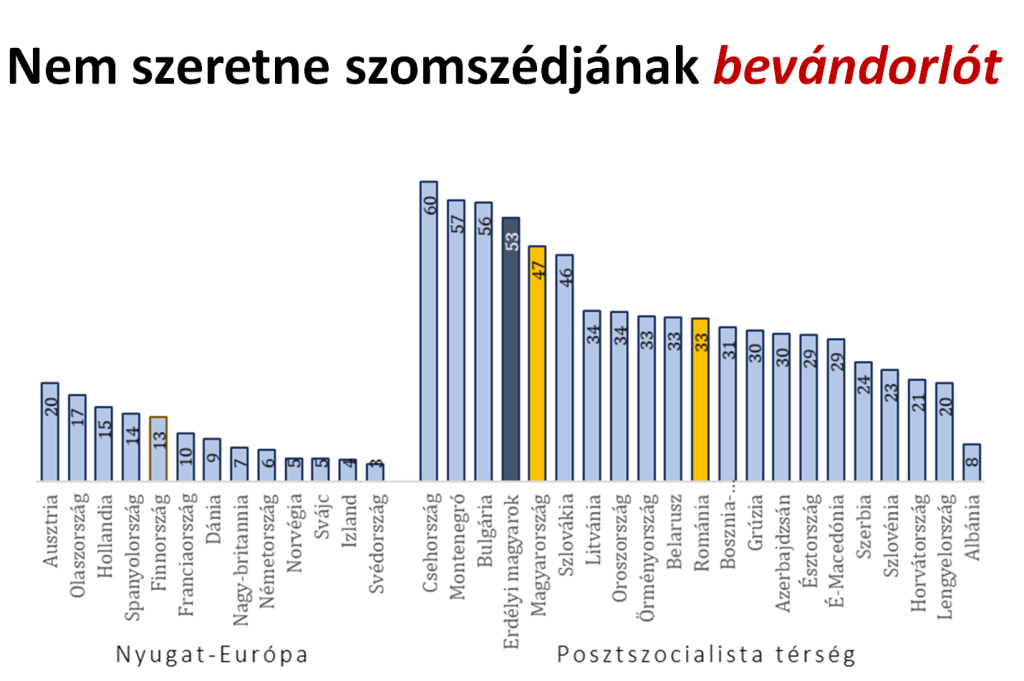Hungarians in Transylvania are more radical and intolerant than both Hungarians living in Hungary and Romanians when it comes to accepting people of another race or immigrants; they also don’t think immigrants benefit the development of the country. So say the results from the second part of the “Hungarians from Transylvania on the European Value Map” study. The first part of the survey focused on family, gender roles and religious practices, while the second wave of questions concentrated on immigration and the acceptance of foreign people. The results were presented by researchers from the Romanian Institute for Research on National Minorities at an online press conference Thursday,
As we presented earlier, this survey is part of the European Values Study (EVS), a large-scale, cross-national survey on basic human values that provides insights into the ideas, beliefs, preferences, attitudes, values and opinions of citizens all over Europe. The newest EVS study was conducted in 42 countries and included, for the first time, national minorities as well, like Swedish people living in Finland or Transylvanian Hungarians.
As sociologist Tamás Kiss said at the press conference, most questions revealed a huge gap between Western European countries and the post-communist countries. In the survey, the researchers asked Europeans if they would object to living next door to people of another race, immigrants, gypsies or Muslims, a question that showed that the citizens of Western countries are more tolerant than those living in Eastern countries.
Citizens of the Czech Republic, Montenegro and Bulgaria are the most intolerant toward immigrants, as 60, 57 and 56 percent, respectively, of the people surveyed said they would not want an immigrant as their neighbor. In this regard, Romania is in the middle, as 33 percent of Romanians surveyed said they do not want to live next to an immigrant. Hungarians are more intolerant: 47 percent of Hungarians living in Hungary and 53 percent of Transylvanian Hungarians would not live next to immigrants, making them the 4th and 5th most intolerant among the post-communist countries. The most tolerant countries are Sweden, Iceland, Switzerland and Norway.

In the other categories, 38 percent of Transylvanian Hungarians would not live next to a person of another race, 52 percent wouldn’t live next to a gypsy, and 42 percent would not want a Muslim as their neighbor. Transylvanian Hungarians are more intolerant than Hungarians living in Hungary or Romanians in these cases as well; the researchers said this may be a result of Hungarian politics, which has increased the intolerance of Transylvanian Hungarians. The intolerance of Hungarians in Hungary also grew, they added.
In some cases, people living in big cities are more intolerant
Tamás Kiss also spoke about the social background of xenophobia, Hungarian news portal maszol.ro reports. The researcher said that there is a widespread view that people living in Szeklerland and rural areas are more intolerant, which is only partly true. According to the sociologist, in rural areas and Szeklerland, a bigger proportion of the people would accept an immigrant or a gypsy as their neighbor compared to those in bigger cities. The study also shows that for people in Szeklerland, there is no difference between gypsies and people from another race, while there is for people living in big cities. This shows the embeddedness of political correctness in urban areas. According to Tamás Kiss, there is no culture of political correctness in the villages of Szeklerland, but they are still more accepting of the Roma in some cases than residents of large urban areas.
The researchers also compared the degree of intolerance to other factors like the death penalty, authority, liberalism in one’s private life, and religiousness. According to the study, those who think that people are trustworthy are more likely to be more open to immigrants. The level of trust of Hungarians living in Transylvania is higher than the Romanian average. Meanwhile, views toward liberalism in one’s private life and the death penalty had nothing to do with intolerance, but Protestants were “significantly more xenophobic” than Catholics.
Immigration does not benefit the economy
The study also analyzed opinions about immigration. Hungarians living in Transylvania do not think that immigration benefits the development of the country, as only 5 percent of them positively assessed the economic effects of immigration. In this regard, the Transylvanian Hungarians are the last in Europe, right after the Czechs (7 percent think the effect of immigration on the country is great or good) and Hungarians living in Hungary (9 percent). The Romanians are more positive in this case: 26 percent see immigration as having a good or great effect. As sociologist Tibor Toró said, on this subject, there is no significant gap between Eastern and Western Europe.
The research also focused on popular statements about immigration – like immigrants take jobs from locals, immigrants bring more crime or immigrants burden a country’s welfare system. In these regards, Romania is rather moderate within the Eastern European region and Hungary is rather high, while Hungarians in Transylvania have somewhat lower scores.
Regarding multiculturalism, Hungarians from Transylvania and Romanians are quite similar, as they reject and approve in the same proportions that “immigrants should preserve their own traditions and customs.” Tibor Toró mentioned that Transylvanian Hungarians cannot decide if they view immigration from a majority or a minority perspective. He also noted that Western European states favor assimilation.
Title image: The newest EVS study was conducted in 42 countries and included, for the first time, national minorities